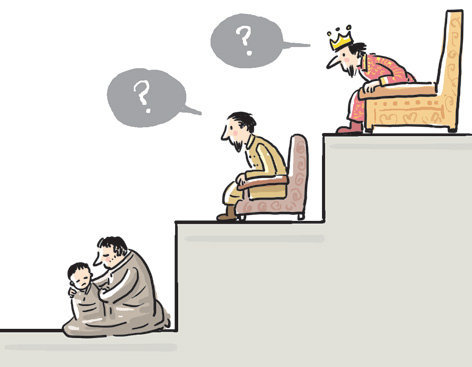Teach fear
Teach fear
Posted March. 09, 2022 07:39,
Updated March. 09, 2022 07:39

Emile, or On Education, written by French philosopher Jean-Jacques Rousseau, is a modern classic that enlightens people of all ages. As its title suggests, it is a treatise on the nature of education. The part on pity in Book 4, in particular, offers a lesson that is still valid.
Rousseau throws a question: why are kings without pity for their subjects? Why does the Nobility have so great a contempt for the people? Why are the rich so hard toward the poor? Rousseau’s answers to these questions are as follows. It is because they count on never being mere men. It is because a noble will never be a commoner. It is because they have no fear of becoming poor. Unlike the 18th century, kings and nobles have almost disappeared today, yet status hierarchies are still a part of our society. Not to mention the rich, there exist kings and nobles in a metaphorical sense.
Writing that when one gets accustomed to view others’ misfortune and misery from above, it becomes impossible to feel compassion, Rousseau advises to educate a child that someday he or she may encounter the same hardship and adversity of the people whom he once felt indifferent toward. By using imagination, one can transcend the boundaries of the self and place himself in the shoes of those in sorrow. Fear of one’s own life being thrown into unexpected existential turmoil, Rousseau argues, is the beginning of compassion for others.
Rousseau believes that human are born good, and therefore, the emotion of pity is already within us. The reason that he starts Emile with the sentence, “God makes all things good; man meddles with them and they become evil,” is, paradoxically, to evoke the goodness inherent in humanity. Rousseau urges to have a belief that human are born good and encourage children to conjure up the emotion of compassion towards others. This is not just pertinent to young people, but rather, it is the lesson we all need to learn, we who try to reign over others without empathy and compassion. Like Rousseau said, neither kings nor nobles will forever remain the same, and the same goes for the rich.






![“잠만 자면 입이 바싹바싹”…잠들기 전에 이것 체크해야 [알쓸톡]](https://dimg.donga.com/c/138/175/90/1/wps/NEWS/IMAGE/2026/02/23/133404747.3.jpg)
